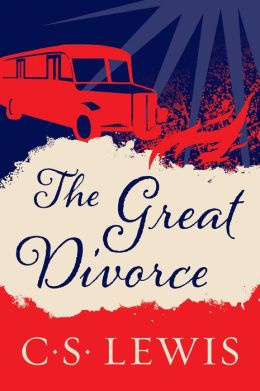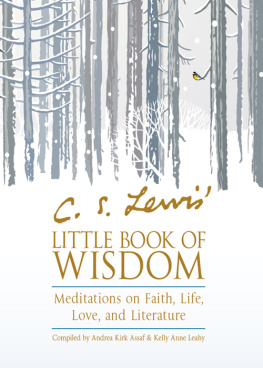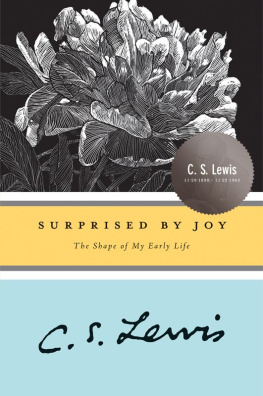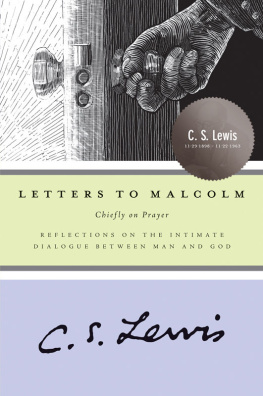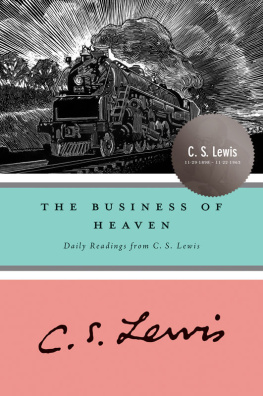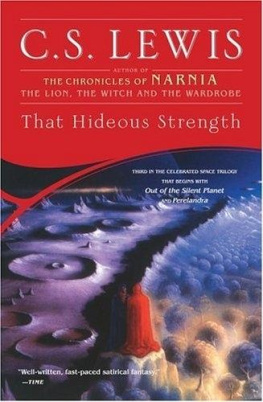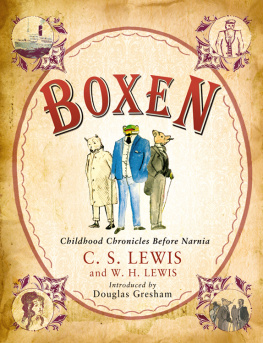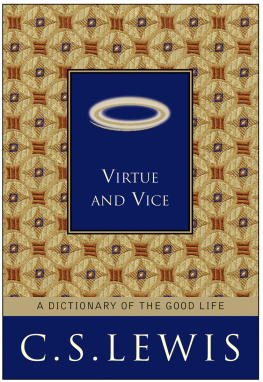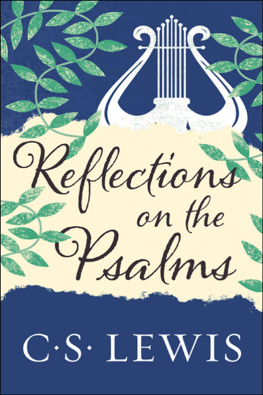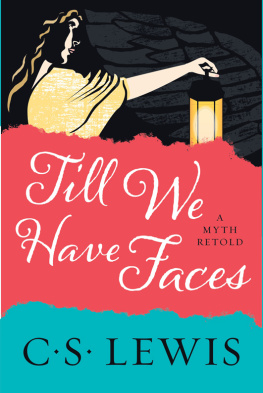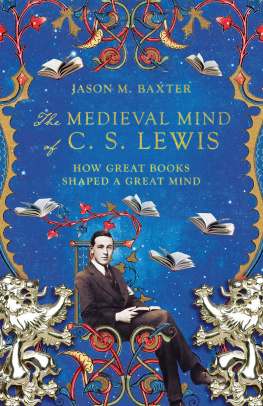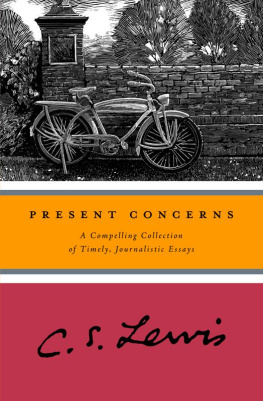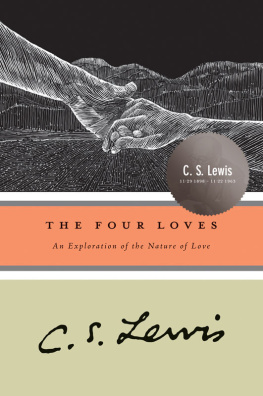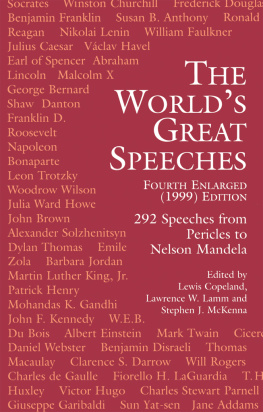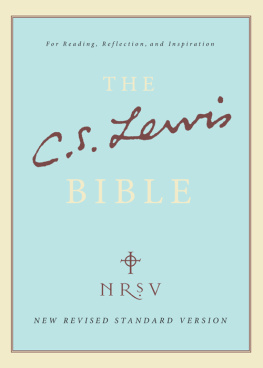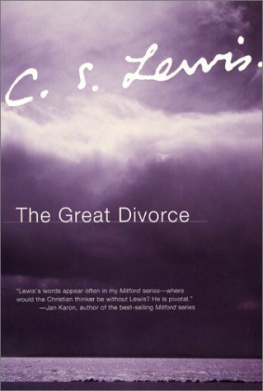C.S. Lewis - The Great Divorce
Here you can read online C.S. Lewis - The Great Divorce full text of the book (entire story) in english for free. Download pdf and epub, get meaning, cover and reviews about this ebook. year: 1946, publisher: MACMILLAN PUBLISHING CO., INC., genre: Religion. Description of the work, (preface) as well as reviews are available. Best literature library LitArk.com created for fans of good reading and offers a wide selection of genres:
Romance novel
Science fiction
Adventure
Detective
Science
History
Home and family
Prose
Art
Politics
Computer
Non-fiction
Religion
Business
Children
Humor
Choose a favorite category and find really read worthwhile books. Enjoy immersion in the world of imagination, feel the emotions of the characters or learn something new for yourself, make an fascinating discovery.
The Great Divorce: summary, description and annotation
We offer to read an annotation, description, summary or preface (depends on what the author of the book "The Great Divorce" wrote himself). If you haven't found the necessary information about the book — write in the comments, we will try to find it.
The Great Divorce — read online for free the complete book (whole text) full work
Below is the text of the book, divided by pages. System saving the place of the last page read, allows you to conveniently read the book "The Great Divorce" online for free, without having to search again every time where you left off. Put a bookmark, and you can go to the page where you finished reading at any time.
Font size:
Interval:
Bookmark:
The Great Divorce
C. S. Lewis
MACMILLAN PUBLISHING CO., INC.
NEW YORK
COPYRIGHT (c ) 1946, BY MACMILLAN PUBLISHING CO., INC.
Preface
BLAKE WROTE the Marriage of Heaven and Hell. If I have written of their Divorce, this is not because I think myself a fit antagonist for so great a genius, nor even because I feel at all sure that I know what he meant. But in some sense or other the attempt to make that marriage is perennial. The attempt is based on the belief that reality never presents us with an absolutely unavoidable "either-or"; that, granted skill and patience and (above all) time enough, some way of embracing both alternatives can always be found; that mere development or adjustment or refinement will somehow turn evil into good without our being called on for a final and total rejection of anything we should like to retain. This belief I take to be a disastrous error. You cannot take all luggage with you on all journeys; on one journey even your right hand and your right eye may be among the things you have to leave behind. We are not living in a world where all roads are radii of a circle and where all, if followed long enough, will therefore draw gradually nearer and finally meet at the centre: rather in a world where every road, after a few miles, forks into two, and each of those into two again, and at each fork you must make a decision. Even on the biological level life is not like a pool but like a tree. It does not move towards unity but away from it and the creatures grow further apart as they increase in perfection. Good, as it ripens, becomes continually more different not only from evil but from other good.
I do not think that all who choose wrong roads perish; but their rescue consists in being put back on the right road. A wrong sum can be put right: but only by going back till you find the error and working it afresh from that point, never by simply going on. Evil can be undone, but it cannot "develop" into good. Time does not heal it. The spell must be unwound, bit by bit, "with backward mutters of dissevering power"-or else not. It is still "either-or." If we insist on keeping Hell (or even earth) we shall not see Heaven: if we accept Heaven we shall not be able to retain even the smallest and most intimate souvenirs of Hell. I believe, to be sure, that any man who reaches Heaven will find that what he abandoned (even in plucking out his right eye) was precisely nothing: that the kernel of what he was really seeking even in his most depraved wishes will be there, beyond expectation, waiting for him in "the High Countries." In that sense it will be true for those who have completed the journey (and for no others) to say that good is everything and Heaven everywhere. But we, at this end of the road, must not try to anticipate that retrospective vision. If we do, we are likely to embrace the false and disastrous converse and fancy that everything is good and everywhere is Heaven.
But what, you ask, of earth? Earth, I think, will not be found by anyone to be in the end a very distinct place. I think earth, if chosen instead of Heaven, will turn out to have been, all along, only a region in Hell: and earth, if put second to Heaven, to have been from the beginning a part of Heaven itself.
There are only two things more to be said about this small book. Firstly, I must acknowledge my debt to a writer whose name I have forgotten and whom I read several years ago in a highly coloured American magazine of what they call " Scientifiction." The unbendable and unbreakable quality of my heavenly matter was suggested to me by him, though he used the fancy for a different and most ingenious purpose. His hero travelled into the past: and there, very properly, found raindrops that would pierce him like bullets and sandwiches that no strength could bite-because, of course, nothing in the past can be altered. I, with less originality but (I hope) equal propriety, have transferred this to the eternal. If the writer of that story ever reads these lines I hope he will accept my grateful acknowledgment. The second thing is this. I beg readers to remember that this is a fantasy. It has of course-or I intended it to have-a moral. But the transmortal conditions are solely an imaginative supposal: they are not even a guess or a speculation at what may actually await us. The last thing I wish is to arouse factual curiosity about the details of the after-world.
C. S. LEWIS April, 1945.
The Great Divorce
1.
I SEEMED to be standing in a bus queue by the side of a long, mean street. Evening was just closing in and it was raining. I had been wandering for hours in similar mean streets, always in the rain and always in evening twilight. Time seemed to have paused on that dismal moment when only a few shops have lit up and it is not yet dark enough for their windows to look cheering. And just as the evening never advanced to night, so my walking had never brought me to the better parts of the town. However far I went I found only dingy lodging houses, small tobacconists, hoardings from which posters hung in rags, windowless warehouses, goods stations without trains, and bookshops of the sort that sell The Works of Aristotle. I never met anyone. But for the little crowd at the bus stop, the whole town seemed to be empty. I think that was why I attached myself to the queue.
I had a stroke of luck right away, for just as I took my stand a little waspish woman who would have been ahead of me snapped out at a man who seemed to be with her, "Very well, then. I won't go at all. So there," and left the queue. "Pray don't imagine," said the man, in a very dignified voice, "that I care about going in the least. I have only been trying to please you, for peace sake. My own feelings are of course a matter of no importance. I quite understand that"-and suiting the action to the word he also walked away. "Come," thought I, "that's two places gained." I was now next to a very short man with a scowl who glanced at me with an expression of extreme disfavour and observed, rather unnecessarily loudly, to the man beyond him, "This sort of thing really makes one think twice about going at all." "What sort of thing?" growled the other, a big beefy person. "Well," said the Short Man, "this is hardly the sort of society I'm used to as a matter of fact." "Huh!" said the Big Man: and then added with a glance at me, "Don't you stand any sauce from him, Mister. You're not afraid of him, are you?" Then, seeing I made no move, he rounded suddenly on the Short Man and said, "Not good enough for you, aren't we? Like your lip." Next moment he had fetched the Short Man one on the side of the face that sent him sprawling into the gutter. "Let him lay, let him lay," said the Big Man to no-one in particular. "I'm a plain man that's what I am and I got to have my rights same as anyone else, see?" As the Short Man showed no disposition to rejoin the queue and soon began limping away, I closed up, rather cautiously, behind the Big Man and congratulated myself on having gained yet another step. A moment later two young people in front of him also left us arm in arm. They were both so trousered , slender, giggly and falsetto that I could be sure of the sex of neither, but it was clear that each for the moment preferred the other to the chance of a place in the bus. "We shall never all get in," said a female voice with a whine in it from some four places ahead of me. "Change places with you for five bob, lady," said someone else. I heard the clink of money and then a scream in the female voice, mixed with roars of laughter from the rest of the crowd. The cheated woman leaped out of her place to fly at the man who had bilked her, but the others immediately closed up and flung her out.... So what with one thing and another the queue had reduced itself to manageable proportions long before the bus appeared. It was a wonderful vehicle, blazing with golden light, heraldically coloured . The Driver himself seemed full of light and he used only one hand to drive with. The other he waved before his face as if to fan away the greasy steam of the rain. A growl went up from the queue as he came in sight. "Looks as if he had a good time of it, eh? ... Bloody pleased with himself, I bet.... My dear, why can't he behave naturally?-Thinks himself too good to look at us.... Who does he imagine he is? ... All that gilding and purple, I call it a wicked waste. Why don't they spend some of the money on their house property down here?- God! I'd like to give him one in the ear-'ole." I could see nothing in the countenance of the Driver to justify all this, unless it were that he had a look of authority and seemed intent on carrying out his job.
Next pageFont size:
Interval:
Bookmark:
Similar books «The Great Divorce»
Look at similar books to The Great Divorce. We have selected literature similar in name and meaning in the hope of providing readers with more options to find new, interesting, not yet read works.
Discussion, reviews of the book The Great Divorce and just readers' own opinions. Leave your comments, write what you think about the work, its meaning or the main characters. Specify what exactly you liked and what you didn't like, and why you think so.

